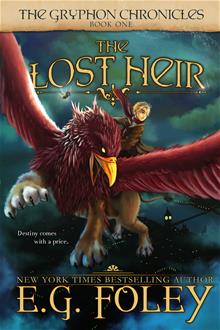 E.G. Foley is actually two authors. The husband/wife team Eric and Gaelen Foley write middle-grade literature and have found success in the world of indie digital publishing. Together they write the fantasy series The Gryphon Chronicles. Gaelen Foley knows the busy world of publishing houses and made a conscious decision with her husband to launch their books for younger readers independently.
E.G. Foley is actually two authors. The husband/wife team Eric and Gaelen Foley write middle-grade literature and have found success in the world of indie digital publishing. Together they write the fantasy series The Gryphon Chronicles. Gaelen Foley knows the busy world of publishing houses and made a conscious decision with her husband to launch their books for younger readers independently.
Here’s the obvious one you’ve probably answered a billion times, why write together and use a single name?
We’re a unit! Actually, this was my doing, and a strategic decision. I wanted to signal my large audience of loyal romance readers—who also happen to be moms, grandmas, and aunts, i.e., the main book buyers for kids in their families—that it was me, the same “G” (Gaelen) Foley they know and trust and have been reading since 1998. But at the same time, I wanted to draw a clear enough distinction between the two names that we wouldn’t have our kid readers coming over to the romance novels, thinking those are for them, too, because they’re not. Those are for grownups.
How did you make the transition from romance to young adult writing?
When I saw famous male writers like James Patterson and John Grisham making the transition from writing their mega-bestseller suspense novels to young adult books, that got my sassy side riled up, and I thought, “Hey, if those guys aren’t afraid to try something completely different and nobody blinks an eye about it, then I’m not going to be intimidated out of trying it just because I’m a female author.” Plus, writing middle grade is just so much fun that I would’ve continued working on it with Eric even if we never ended up publishing it. It was always a labor of love, not commerce.
What I have learned by just forging ahead with it is that there really is no reason for a writer to pigeon-hole him or herself artistically just because the industry is set up to do it that way. It’s dangerous to allow others to define who we are. Also, the basic skill set involved in novel writing transfers from one type of book to another. Once you understand how to do characterization, conflict, pacing, story structure, etc. then it just becomes a matter of exercising your imagination to apply those tools in a new way.
Put it this way, if you’re a good cook, it doesn’t matter so much whether you’re making casserole or cupcakes—it’s going to be yummy, simply because you know what you’re doing in the kitchen. Whatever you do a lot, you get good at. Well, I’ve been writing full-time for 17 years, so even though there is always more to learn, I came into writing kidlit with a very solid foundation of over 2.5 million words in print and many appearances on national bestseller lists under my belt. You never know what you can do until you try!
Are your books applicable for the classroom and how?
 Indeed. First, I’d mention that The Gryphon Chronicles are now accepted in the Accelerated Reader Program in schools. The Lost Heir (Book 1) was pegged at 5.5 grade level, but we’ve heard from parents and kids as young as 8 who have enjoyed them. It just depends on the kid. The areas where I think teachers would find it useful would be for language arts, since we do not dumb down our writing style—kids are smart! Also, for any history modules dealing with the Victorian era, for example: How kids in the 1800s were educated, from governesses and home tutors to prep schools and finishing schools for the rich and mandatory education for the poor. (Did you know that in Victorian times, kids were only required to go to school to age 9?! Sorry, kid, you’re 10 now, go get a job! LOL. Hard to imagine!)
Indeed. First, I’d mention that The Gryphon Chronicles are now accepted in the Accelerated Reader Program in schools. The Lost Heir (Book 1) was pegged at 5.5 grade level, but we’ve heard from parents and kids as young as 8 who have enjoyed them. It just depends on the kid. The areas where I think teachers would find it useful would be for language arts, since we do not dumb down our writing style—kids are smart! Also, for any history modules dealing with the Victorian era, for example: How kids in the 1800s were educated, from governesses and home tutors to prep schools and finishing schools for the rich and mandatory education for the poor. (Did you know that in Victorian times, kids were only required to go to school to age 9?! Sorry, kid, you’re 10 now, go get a job! LOL. Hard to imagine!)
Other topics include things like child labor, the apprenticeship system, orphans and orphanages, and crime and punishment for children in Victorian England—quite appropriate, since our hero, Jake, starts out as a pickpocket! The series would also be of use in a study of mythical creatures from British folklore. The Victorian era saw a wonderful resurgence in the old fairy lore. Another area that we touch upon (especially in Book 2, Jake & the Giant) is the many inventions of the era. Jake’s sidekick, Cousin Archie, is a boy genius who loves inventing things, so that lets us touch upon the scientific news of the day, such as whatever Mr. Edison and Mr. Tesla were up to that year. Obviously, these books take a lot of research!
Since you’re self-published, do you find getting books in hands more difficult?
Paperbacks, yes; e-books, no. I think we sell many, many more middle grade e-books than publishers do because our price ($4.99 or so) is half of theirs. … Indie platforms allow us to control our pricing ourselves, and as with all things indie, it’s very empowering having that control. Plus, we can afford to do that for our readers because we don’t have to pay for a skyscraper in Manhattan!
Do you think you would be ready to sign on with a publisher for your children’s work now that you’ve had some success independently?
The reason we never sought a publisher in the first place was because I didn’t want the stress of two sets of legally binding contract deadlines. In the ensuing years, though, I’ve become much more efficient at juggling several different projects at one time. So I don’t think that would be an issue anymore.
We’re open to giving publishers a first look at our next series, as they certainly have a wonderful infrastructure in place for getting kids’ books into schools and libraries and, of course, into all those super-fun children’s indie brick-and-mortar bookstores and the national chains. However, there would need to be some negotiation to ensure the contract would not infringe on our ability to continue self-publishing other projects at the same time, and they’d have to at least match the very good money we can make on our own with the far more generous royalty rates … (from) indie platforms give to authors/content creators. Contracts can be minefields that tie up an author’s rights for the life of the copyright (i.e., until 70 years after you’re dead). So the pros would have to outweigh the cons.
April Hall is editor of Literacy Daily. A journalist for 20 years, she has specialized in education, writing and editing for newspapers, websites, and magazines.